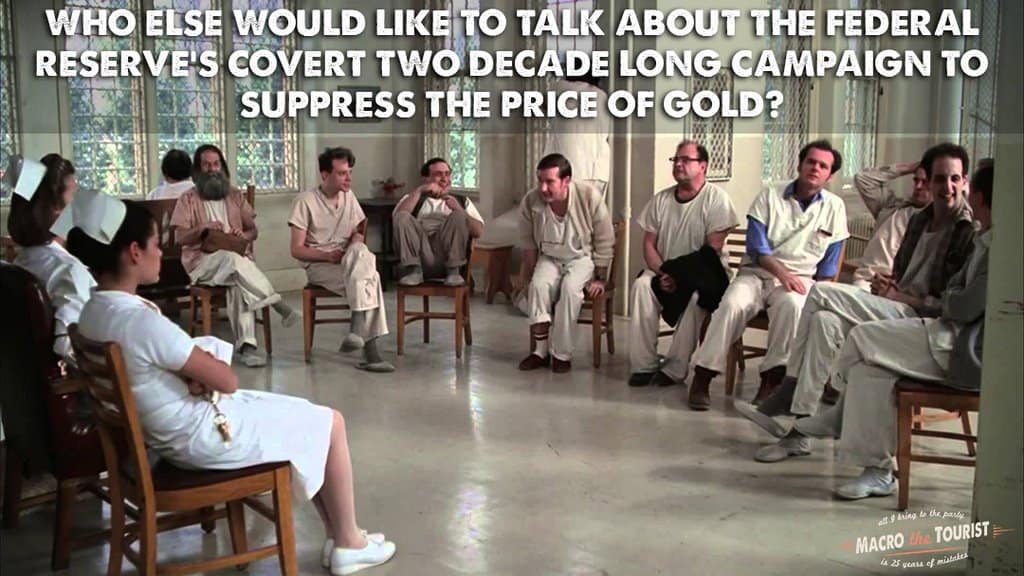If you take just a single thing from today's blog recommendation, make it reading this article about the possible return of inflation (but only once you have read MY article for added context – stay with me!).
The article manages to turn a boring, complex and abstract subject into one that is understandable, interesting and relevant.
It briefly explains and analyses how and why inflation could become one of the most important, powerful aspects to influence your investments over the coming years. Put another way, if you want to grow and protect your assets, can you afford not to know about unexpected inflation risks? Are there even some highly attractive investment opportunities to be discovered if inflation were to make a surprise return? The powerful article covers it all, if only briefly and as a stepping stone towards ongoing reporting.
Welcome to the world of Kevin Muir, aka "the MacroTourist".
Since discovering the Canadian's blog a few weeks ago, it has become one of my favourite reads. How could I not have found it earlier?
Personal growth happens outside of your comfort zone
As part of my reading routine, I make a conscious effort to look at authors who write about subjects outside my own radar. These authors are teaching me lessons about what I am missing in my view of the world, and they are pushing me to learn about stuff that I know too little about (something I recommend to everyone).
As you will know from reading my blog, I am first and foremost a stock picker. Subjects such as interest rates, exchange rates, REPO rates, inflation rates or corporate debt levels only make marginal appearances in my day-to-day research.
That's why I find Kevin Muir's blog so useful. As the name suggests, much of the writing and investment analysis revolves around MACRO issues.
Crucially, Kevin has the rare gift of writing about those issues in a way that doesn't make me fall asleep. Quite the opposite, he makes them come alive because he considers his audience before publishing a new piece. Like myself, he views writing as a useful process for putting his thoughts into order AND exposing them to a critical audience for feedback. The results are often highly readable, valuable pieces about big subjects that could have a significant influence on your investment success.
Kevin is also one of those rare bloggers who go completely against the prevailing view. The MacroTourist presents investment cases that are built on the back of being ultra-contrarian. Very, very few people can come up with a combination of original, contrarian, and accessible investment writing.
The aforementioned recent piece about a possible return of inflation is the best example (shortened for easier skimming):
"My longer-term goal …. is to … take advantage of what I believe to be the next major market disruption - a return of inflation.
I believe we are on the cusp of a dramatic economic shift. In 1981 no one could imagine inflation doing anything except go higher. Today we are at the opposite extreme. Investors are convinced the three D's (debt, demographics and disinflation from technology) doom us to a world of extremely low inflation (and interest rates)
…
Inflation has been almost priced out of financial assets. No one believes it will return, so there is little reason to hedge for it. Inflation protection is dirt cheap.
…
A return of inflation is the one thing shockingly few are positioned for, and therefore, offers a terrific opportunity."
How did Kevin get to write about such big ideas?
His personal story is interesting in its own right and it helps to appreciate the thinking behind his blog.
FREE eBook: The world's best investing blogs
What are the best blogs to help you become a better investor and improve your returns?
Check out “The world’s best investing blogs” for my very own top 30.
So much experience – and it's yours for free!
If you think bloggers are mostly 20-something or 30-something kids, think again. Kevin is a middle-aged guy who has seen a lot in life. Or, as the tagline of his blog says: "All I bring to the party is twenty-five years of mistakes."
As a self-described aficionado of trading and computers, he started an online trading journal. With a growing fanbase, he ended up getting quoted in publications such as Barron's, Bloomberg and MarketWatch. His Twitter feed currently has 20,000 followers.
Kevin has spent many years working for a bank as well as an investment management company but has recently gone freelance again. He is focussed on trading with his own money and promised his community to write more regularly once again (which his recent output has lived up to). There'll be no more corporate compliance department "editing" his viewpoints, at least for now. He also has the ambition to launch a fund that will take advantage of the paradigm shift he expects in inflation. That's an idea he has put out to his community for feedback (here is his email address if you want to get in touch).
In the meantime, he is entirely focussed on finding macro trends and investment ideas that no one else believes in. In a Seeking Alpha interview, Kevin once described his approach to investment analysis. The following paragraphs are something to behold for anyone who appreciates the difficulty and potential reward from not running with the herd (bold part highlighted by me):
"Often people would ask me what area of the market I specialized in. Or they may be more blunt and straight out say how do I make money. I would tell them that I often didn’t have a clue where I would make my money. All I could say is that I was constantly watching the markets for opportunities and I was hopeful to be clever enough to recognize them.
…
Every year seemed to be different and flexibility seemed to be my greatest strength.
The 'hard trades are most often the right trades' refers to the idea that often, the best trades are ones that few other market participants are recommending. These are the trades that when you make them, everyone tells you how wrong you are. These trades often make you feel sick when you execute them as you are so alone. It feels like you are the only one who doesn’t 'get it.'
Writing a newsletter is an interesting exercise. By definition the more popular a post, the more likely it confirms traders’ existing positions. People want that confirmation bias. Therefore when I have a post where everyone agrees with my analysis, I generally know this idea has the potential to already be discounted by the market.
However, if I have a post that is universally decreed, then I know I might be onto something. The posts with the most pushback, the ones when market participants feel most confident to write me to tell me how wrong I am are the ones they should be most scared about.
This is what I mean when I say, 'the hard trades are most often the right trades.' The more difficult it is to execute because everyone around you believes the opposite, the more likely it will work. If trading was easy and trades 'felt good', then everyone would do it and be rich. But trading is hard and the worse a trade feels, often the better it is.
…
I don’t mind being alone in a trade. In fact, I often feel better."
Speak of opportunistically finding and pursuing opportunities! Even though Kevin has an entirely different universe of investment ideas and themes, it's easy to spot why I share such enthusiasm for his work. Not only does the MacroTourist broaden my horizon, but it also provides me with one or the other valuable, concrete investment inspiration.
Never mind that it's also fun to read. It features a never-ending stream of memes, all relevant and many of them hilariously funny – something that I wished more financial publications would do (and something that I'll try to do more myself).
Here is a selection of my recent favourites.












If you learn one thing from the MacroTourist, make it this one
Today's recommended blog is quite different from the two previous ones. When I wrote about Lyn Alden and Lyall Taylor's LT3000, I knew they were going to appeal to my stock-picking audience (and they did!).
I expect today's article to be less popular than the two previous recommendations. The MacroTourist does touch on a wide range of subjects, such as the mainstream media's often distorted (and sometimes, outright incompetent) reporting, and occasionally kicks of fascinating Twitter discussions by making controversial posts. Still, macro subjects are less popular in general, no matter how much one tries to make them sound interesting. They are also usually much harder to bet on because it often requires more than just buying and selling a specific stock.
As Kevin says, inflation could turn out to be the most under-appreciated danger of the investment world (and at the same time, one of the biggest opportunities for those who find smart ways how to bet on it while no one else does). Few would disagree that what has happened in the monetary world since the Great Financial Crisis is complete and utter madness. You'll probably also find it difficult to locate anyone who doesn't agree that inflation is the thing that no one is expecting to make a comeback.
The MacroTourist believes that despite all the voodoo and promises by central bankers and the politicians that rely on them, "there will come a point where inflation cannot be controlled anymore. The problems of disinflation will go away and be replaced with a problem of inflation." (Quote taken from a TV interview he did.)
I'll keep reading the MacroTourist because I know that Kevin Muir has now taken a deep, ongoing interest in the subject of inflation. It sounds like he will continue do a lot of thinking about it, and I am convinced that he will look at it without being biased by a job in a bank, an investment fund, or a government bureaucracy. His interest is to analyse how "Modern Monetary Theory" affects the economy, and how the entire plumbing of the economy works.
I am not saying his view about a return of inflation is right, nor do I offer any counter analysis. But following this one subject via someone who is singularly focussed on it and can also write well is bound to be a fun, insightful experience.
Blog series: Blogs to watch
There's more to "Blogs to watch" than this Weekly Dispatch. Check out my other articles of this 30-part blog series.
Did you find this article useful and enjoyable? If you want to read my next articles right when they come out, please sign up to my email list.
Share this post:
Get ahead of the crowd with my investment ideas!
Become a Member (just $49 a year!) and unlock:
- 10 extensive research reports per year
- Archive with all past research reports
- Updates on previous research reports
- 2 special publications per year








